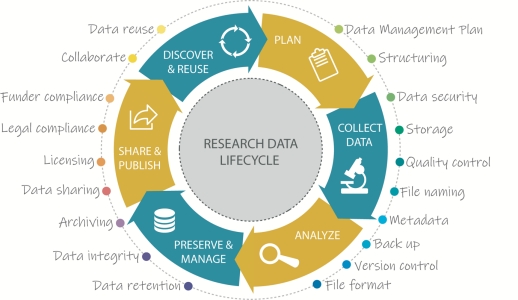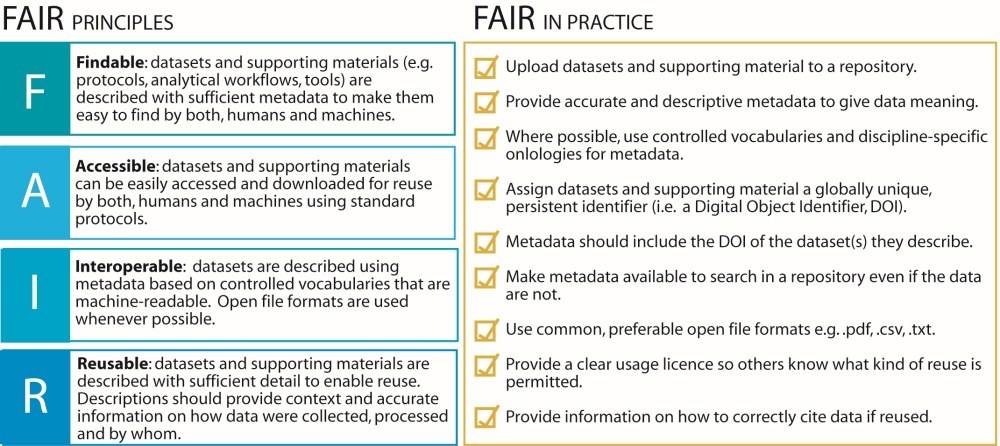RDM, Open Science and FAIR Principles
Introduction to be added
Research Data Management
What is research data?
Research data is the information needed ‘to support or validate a research project’s observations, findings or outputs’; it is a valuable asset and should be accurate and securely stored.
Research data can be quantitative or qualitative and can come in many different forms e.g. lab books (hard or electronic), print-outs, spreadsheets, databases, audio, visual, simulations, models and more.
What is Research Data Management?
Research Data Management (RDM) is an umbrella term used to describe all the activities researchers do to organise, describe, preserve and share research data. Data management practices are important at all stages of the research lifecycle, from planning what data to collect, where to store it and what happens to it at the end of the research project.
Why does Research Data Management matter?
Technological advancements in the last decade have greatly accelerated the rate at which research data is generated, bringing with it a myriad of challenges for data storage and management.
Effective data management is an essential professional skill that can boost efficiency by making it easier to understand and share data, analyses and conclusions. At the most basic level RDM is about helping your future self, and your colleagues, to locate and understand experimental data and analyses. Additionally, where projects involve personal and sensitive data, a robust approach to data management is essential to ensure legal compliance. Beyond this, excellent data management is promoted as a foundation for scientific advancement by supporting Open Science.
In recognition of importance of RDM many funders and the University now require a data management plan to be completed as part funding applications.
For guidance on RDM best practice see the Working section of this website.
Follow the links for UoM research data management policy and standard operating procedures.

A typical research data lifecycle
A Data Management Plan is required at the start of a research project, which outlines what data will be collected and how data will be stored, analysed and made available for reuse. Publicly available data can be used as a basis to support existing and new research projects.
Open Science
What is Open Science?
Open Science seeks to maximise the value of publicly funded research by enabling others to access and reuse research outputs, such as data, publications and software, with no or minimal restrictions. Researchers benefit from Open Science by having access to publicly available data that can support their own work and lead to new insights. Additionally, by sharing their own data researchers can boost their visibility and impact. In support of Open Science, funders and universities increasingly promote open access publication and data sharing though 3rd party and/or institutional repositories. Tools like Figshare and OSF can be used to make data publicly available, these can be particularly useful outlets for data that might not otherwise form part of a research publication e.g. negative data, conference posters or data that is generated tangentially during a research project.
Greater openness and transparency are seen as means to tackle reproducibility issues by enabling others to validate research conclusions. Full transparency means that data must be shared in an open format with sufficient metadata and documentation for it to be understood, re-analysed and reused. The FAIR Principles (see below) have been defined to help researchers prepare data for sharing openly.
Further information can be found on University's Open Science webpages.
FAIR Principles
What are FAIR Principles?
The FAIR Principles are a set of guidelines designed to assist in the discovery and reuse of data, by making data findable, accessible, interoperable and ultimately reusable. These principles also apply to the tools, algorithms and analytical workflows that were used to generate the data. FAIR principles emphasise machine-actionability, that is, the ability for computational systems to find, access and reuse data with minimal human intervention. This approach anticipates increasing utilisation of machines to support research as the volume and complexity of research data increases. Many repositories are designed to enable researchers to make their data FAIR.
Fair Principles Summary

Access a short course on how to make your data FAIR:
- Assessing the FAIRness of data (external website)
